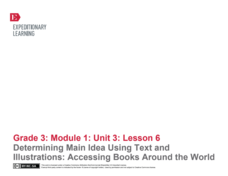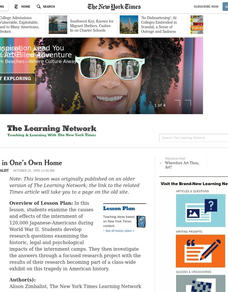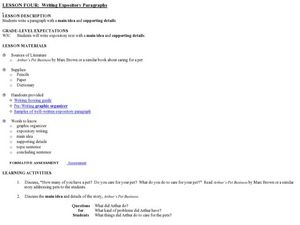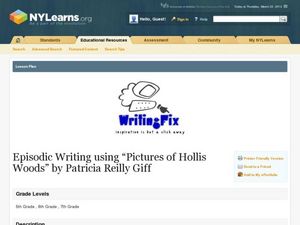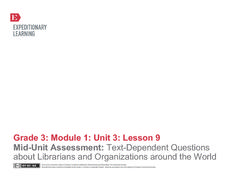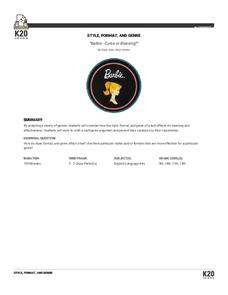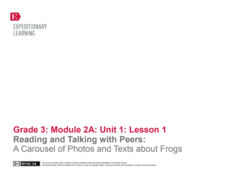EngageNY
Determining Main Idea Using Text and Illustrations: Accessing Books Around the World
Ease into informational text with the lesson suggested here. Part of a unit series, the lesson draws from previous lessons and acts as a natural moment to add in informational text. Class members read one section of My Librarian is a...
University Interscholastic League
English Lesson to Prepare for UIL Spelling and Vocabulary Contest
"i before e. . ." Spelling is easier if kids know the eight basic spelling rules contained in this resource packet.
Boston University
South African Short Stories: Apartheid, Civil Rights, and You
How are short stories from South Africa connected to issues of civil rights in the United States? A unit plan uses South African short stories to discuss issues such as apartheid, colonization, and civil rights. Questions and activities...
Curated OER
Prisoner in One's Own Home
Examine the internment of Japanese-Americans during World War II. After reading an article from the New York Times and exploring the author's word choice, young readers find the central idea in the text and work on researching...
Curated OER
Writing Expository Paragraphs
Students read Arthur's Pet Business and complete a pre-writing worksheet for expository writing. In this paragraph writing lesson, students gather and organize material for a paragraph about pets.
Curated OER
Episodic Writing Using Pictures of Hollis Woods by Patricia Reilly Giff
Help your middle-schoolers expand their writing skills with this lesson plan on episodic writing, which focuses on story details, idea development, and organization. After reading "The Eighth Picture: End of Summer" from Patricia Reilly...
Curated OER
The Time Machine
Challenge your class with this instructional activity! Learners read The Time Machine by H.G. Wells, discuss context clues, identify main ideas and details, and analyze story elements. Discussion questions and activities are broken down...
Curated OER
Dramatic Structure
As part of an lesson involving literature or writing, have your learners watch and discuss this presentation on plot development. In a series of slides, viewers engage in an activity to explore dramatic structure, including plot...
EngageNY
Mid-Unit Assessment: Answering Text-Dependent Questions About Librarians and Organizations Around the World
This is a skills-based assessment that asks test takers to use textual evidence to determine the main idea of an excerpt from an informational text as well as respond to text-dependent questions. The assessment is the middle point...
Core Knowledge Foundation
Sixth Grade Poetry
Study some of the most prominent poets and works of poetry in history with a language arts poetry unit. From Virgil to Shakespeare to Dickinson to Angelou, the resources present biographies and examples of poetic elements to...
EngageNY
Leaving the Play: All’s Well That Ends Well
How does Shakespeare develop the theme of control in A Midsummer Night's Dream? Using the resource, scholars analyze the theme of parental control in the play and the Greek myth "Pyramus and Thisbe." Next, they talk to partners to...
Perkins School for the Blind
What Would You Do If...?
What would you do if...? That's a great question, and, when posed to learners with visual impairments, a question that can foster concept development and speaking and problem-solving skills that relate to real-life situations. The...
Curated OER
Creating Civic Awareness Through Artistic and Literary Forms
Interpret current events using editorial cartoons and other print media. Middle schoolers explore the meanings of literary and artistic terms such as satire, irony, and caricature. They visit internet sites to develop an understanding of...
University of Oklahoma
Barbie™: Blessing or Curse? - Style, Format, and Genre
Barbie has been an iconic figure in the lives of girls since the 1950s, but her existence has been full of controversy. A lesson plan on style, format, and genre explores that controversy by looking at three texts with different...
EngageNY
Reading and Talking with Peers: A Carousel of Photos and Texts about Frogs
Frogs are the theme of a lesson plan that challenges scholars to examine photographs, read informational texts, then ask and answer questions. Scholars work collaboratelively as they rotate through stations, discuss their observations,...
EngageNY
Advocating Persuasively in a Fishbowl: Practice
What makes a good advocate? An informative lesson plan teaches class members how to advocate persuasively. They participate in a fishbowl activity and listen to the teacher model advocating persuasively. They then practice independently,...
Education World
Take Five: Writing a Color-Coded Paragraph
Use a traffic light to model a very basic paragraph plan. The Go, or topic sentence, is written in green and expresses an opinion about the topic. Information that supports the opinion of the Go sentence is written in yellow and the...
The New York Times
Great Debate: Developing Argumentation Skills
"Advertising has no impact on whether people buy something." "Looting is morally permissible during national disasters and emergencies." "Gay teenagers should be allowed to take dates to the prom." Considering a class debate? Check out...
Academy of American Poets
Poems about Poetry
Learners of all ages hear the words “Today we’re going to start poetry” and begin their plans to drop out of school. It is not the teacher's fault! Use this resource to help young scholars understand the genre of poetry and why it is...
Curated OER
Lesson: Allison Smith: What Are You Fighting For?
Trench art is a nontraditional art form created by soldiers in trenches during wartime. Artist Allison Smith connects her art to the American Revolution and the question: "What are you fighting for?" Kids examine her art, how it connects...
Curated OER
Billy Brown and the Belly Button Beastie
Students explore the book Billy Brown and the Belly Button Beastie. In this verb, onomatopoeia, and syllable lesson, students pantomime verbs, read onomatopoeia from the story and clap out syllables. Students unscramble sentences from...
EngageNY
End of Unit 1 Assessment: Inferring and Synthesizing (From Two Texts) About Life in Colonial America
Close your colonial America unit with a performance-based assessment. Class members will show their proficiency in several skills including using details to back up inferences, determining the meaning of words in context,...
Pulitzer Center
Peacebuilding: Taking Home Lessons Learned in Africa
Learners take a closer look at one journalist's work on UN Peacebuilding efforts in four African nations: Sierra Leone, Burundi, Central African Republic, and Guinea Bissau. They collaborate to define peacebuilding and discuss...
EngageNY
Revising for Organization and Style: Exciting Endings
Young writers compose a gripping ending to their historical fiction narratives. Following the previous lesson plan, where learners wrote a bold beginning, class members examine exciting endings from a literary text. They then draft their...
